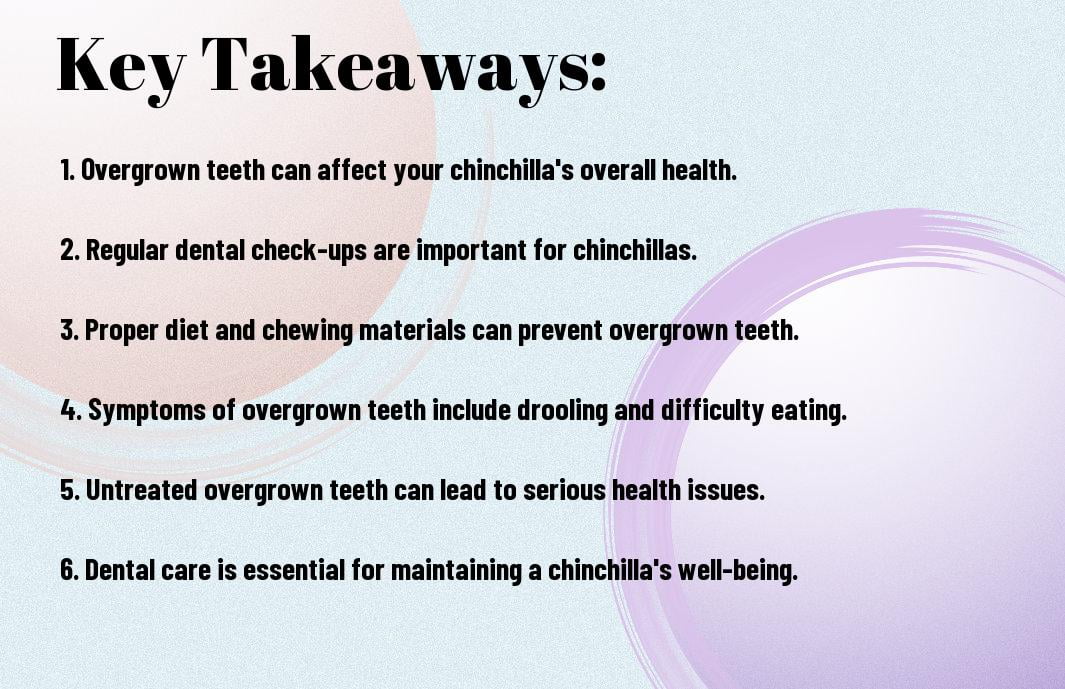Are Overgrown Teeth Affecting Your Chinchilla’s Mouth Health?
Do you know that malocclusion is a common problem in chinchillas that can have serious consequences for their health? This condition, characterized by overgrown teeth, can lead to pain, difficulty eating, and even oral infections if left untreated. In this informative blog post, we will discuss the causes of overgrown teeth in chinchillas, the potential health risks, and most importantly, how you can prevent and address this issue to ensure your pet’s oral health.
We are supported by our audience. When you purchase through links on our site, we may earn an affiliate commission, at no extra cost for you. Learn more. Last update on 27th July 2024 / Images from Amazon Product Advertising API.

Understanding a Chinchilla’s Dental Anatomy
One important factor to consider when it comes to your chinchilla’s dental health is their unique dental anatomy. Chinchillas have open-rooted teeth, which means that their teeth continue to grow throughout their lives. This is in contrast to humans, whose teeth stop growing once they reach a certain size. Additionally, chinchillas have a strong jaw and large, sharp incisors that they use for chewing on tough grasses and hay. For more information on chinchilla dental problems, you can visit Dental Problems: Chinchillas | Arizona Exotics.
Peculiarity of Chinchilla Teeth
Chinchillas have a unique set of dental needs due to the nature of their teeth. Their open-rooted teeth continue to grow at a rapid pace, which means that they constantly need to wear down their teeth by chewing on hard and fibrous foods. If their teeth become overgrown, it can lead to significant health issues including mouth pain, difficulties eating, and dental disease.
Dental Problems in Chinchillas: An Overview
Understanding the potential dental problems your chinchilla may face is crucial for maintaining their overall health. Overgrown teeth are a common issue in chinchillas, and they can lead to serious complications if left untreated. Additionally, dental problems in chinchillas can affect their ability to eat properly, leading to malnutrition and weight loss. Regular dental check-ups and providing appropriate chew toys are essential for preventing dental issues in your chinchilla.
Impact of Overgrown Teeth on Chinchilla’s Health
Obviously, overgrown teeth can have a significant impact on your chinchilla’s overall health. When a chinchilla’s teeth become overgrown, a condition known as malocclusion, it can lead to a variety of health issues that can affect their ability to eat, groom, and even breathe properly.
Signs Your Chinchilla Could be Suffering from Overgrown Teeth
If you suspect that your chinchilla may be suffering from overgrown teeth, there are several signs to look out for. Your chinchilla may exhibit difficulty eating, drooling, weight loss, and a decrease in grooming behavior. Additionally, you may notice that your chinchilla is producing less fecal matter, which can also be a sign of dental problems. If you notice any of these signs, it’s important to have your chinchilla examined by a veterinarian as soon as possible.
The Consequences of Overgrown Teeth for Chinchillas
Overgrown teeth can have serious consequences for your chinchilla. If left untreated, overgrown teeth can lead to more severe dental issues, such as abscesses, infections, and even difficulty breathing due to oral obstruction. In severe cases, overgrown teeth can even be life-threatening for chinchillas. It’s essential to monitor your chinchilla’s dental health regularly and seek veterinary care at the first sign of trouble.
Preventing and Managing Overgrown Teeth in Chinchillas
Despite your best efforts, chinchillas can still develop overgrown teeth. However, there are steps you can take to prevent and manage this issue to ensure your chinchilla maintains good oral health.
Daily Care and Preventative Measures
Proper daily care and preventative measures can go a long way in preventing overgrown teeth in your chinchilla. One of the most important things you can do is provide your chinchilla with a balanced diet that includes plenty of hay and fiber. Additionally, giving your chinchilla safe chew toys and sticks can help naturally wear down their teeth. Regularly monitoring your chinchilla’s teeth and keeping an eye out for any signs of overgrowth can also help catch the issue early on.
Treatment Options for Overgrown Teeth
If you suspect that your chinchilla has overgrown teeth, it’s important to seek veterinary care as soon as possible. Your vet may need to perform a dental procedure to trim the teeth. Additionally, they may recommend changes to your chinchilla’s diet or provide you with special tools to help manage the overgrowth. It’s crucial to follow your vet’s recommendations for treatment and follow-up care to ensure that your chinchilla’s oral health is properly managed.
By staying vigilant and proactive in your chinchilla’s dental care, you can prevent and manage overgrown teeth, **ensuring your chinchilla maintains a healthy, pain-free mouth**. Regular monitoring, a balanced diet, and seeking veterinary care at the first sign of trouble are the keys to keeping your chinchilla’s teeth in top shape.
Are Overgrown Teeth Affecting Your Chinchilla’s Mouth Health?
Drawing together all the information presented, it is clear that overgrown teeth can have a severe impact on your chinchilla’s mouth health. It is crucial to regularly monitor and maintain your chinchilla’s dental health to prevent overgrown teeth from causing pain, injury, or malocclusion. By providing proper nutrition, safe chew toys, and regular dental check-ups, you can ensure that your chinchilla maintains a healthy and comfortable mouth. Remember to always consult a veterinarian if you suspect any dental issues with your chinchilla to receive proper care and guidance.